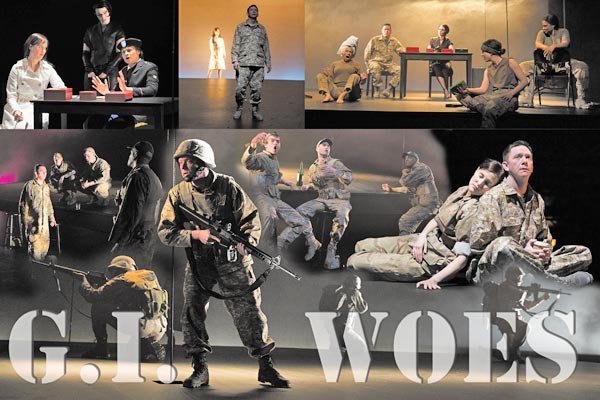Pulitzer Prize-winning out playwright Paula Vogel is taking theatergoers on a journey through time and space to explore the plight of Iraq War veterans in the world premiere of her latest play, “Don Juan Comes Home from Iraq,” running through April 20 at The Wilma Theater.
The story follows a Marine who returns home from war to discover that his lover is missing. In his search for her, he embarks on a surreal journey through the streets and history of Philadelphia.
Vogel said the play is partly inspired by the 1936 play “Don Juan Returns from the War,” written by Ödön von Horváth.
Von Horváth’s play follows a shell-shocked main character returning home to Berlin from World War I who feels out of step with society. Vogel said the two works have similar themes.
“I think it’s one person’s journey,” she said. “I think it’s the aftermath of war. I think it’s the wish to start over and make amends for the Don Juan character. I think it’s a repentant play in a way. There is a divide between the people who fought the war and the civilian population.”
For further inspiration and research, Vogel also drew upon the experiences of recent Iraq and Afghanistan war veterans, many of whom returned home to a place where their fellow citizens had little or no direct connections with the war.
“I don’t ever really directly quote anybody when I’m doing research,” she said. “I don’t use anybody’s actual experience or words if I can help it. But I’d say that it is a composite of two years of reading and interviews. Definitely the generosity of the veterans that talked to me and worked with me in my workshops were inspirational and informed my creation. Truthfully, the piece was also informed by my having to write for nine specific company members that had already been chosen. We had selected these nine actors from Philadelphia and I had to think, How I can create an arc for each character? I don’t know a single writer that has one impulse for any creation of work. I don’t think plays are really formed that way. Maybe nonfiction is. Maybe poetry is in the first person, but plays are a layered collaboration. There are a lot of voices here. There’s a dead playwright from 100 years ago, Ödön von Horváth. There’s a playwright from 300 years ago, Tirso de Molina, who wrote the first ‘Don Juan’ play. There are Don Juans from the last 300-plus years that have been inspirational, including Molière and Don Giovanni. It’s a wonderful, rich process for me and I am constantly challenged and never get bored for a moment.”
Vogel added that she also researched stories from other famous wars for this play, such as the Civil War story “Occurrence at Owl Creek Bride” by Ambrose Piece.
“I really feel at lot of literature from the Civil War was exploring something that we would not have called PTSD [post-traumatic stress disorder] back then. The nostalgia and dislocation of Civil War veterans are absolutely parallel. I do think recent traumas create that kind of suspension of real time and real place.”
During this process, Vogel had a slight mishap that she used to further delve into the experiences of soldiers returning home from war.
“One of the fortunate things for me as I was listening and reading the books from the references and resources from the Iraq War was that I had a small accident where I tripped and fell and gave myself a significant concussion,” she said, “I didn’t cancel my trip down to Philadelphia because I thought, When am I ever going to have this chance again to have a little brain injury and walk through the neighborhoods of Philadelphia? It was really phenomenal to me to wake up one moment and I’m walking in Old City and then wake up the next moment and I’m in the Italian Market and I don’t know how I got there. So that’s just a little tiny blip of what people experience in terms of traumatic brain injuries in this war. It’s one of the signature wounds in the Iraq War.”
Vogel said she can’t imagine all audience members not being affected in some way by the story of “Don Juan Comes Home from Iraq,” noting the process of writing and researching the play has forever changed her own views of how America perceives and treats its war veterans.
“I spent two years researching the subject and talking to veterans,” she said. “I definitely changed from this process but I can’t predict [what audiences will take away from seeing the play]. I couldn’t even tell you. When you experience something significant in your life, how long does it take to express itself? I will never walk by a veteran. I will be paying attention in a much different way. I was very scared when I started because there has never been in my lifetime such a rupture between the people who serve our country in the military and us as civilians. We have almost a news blackout in terms of our attention as Americans and we should be ashamed. We should become allowed to become aware and get active. I really feel, after 10 years in Iraq, people are paying a price and we as Americans aren’t paying attention. Seeing these men and women has really changed my outlook. I’ve been very curious in terms of how our notion of gender and sexuality changes in terms of the military. Certainly the military is a hotbed of what it means to be a woman in the 21st century and what it means to be queer. We have a 19th-century military in a 21st-century America and I don’t think that’s a good mixture.”
The Wilma Theater presents “Don Juan Comes Home from Iraq” through April 20, 265 S. Broad St. For more information or tickets, call 215-546-7824 or visit www.wilmatheater.org.

